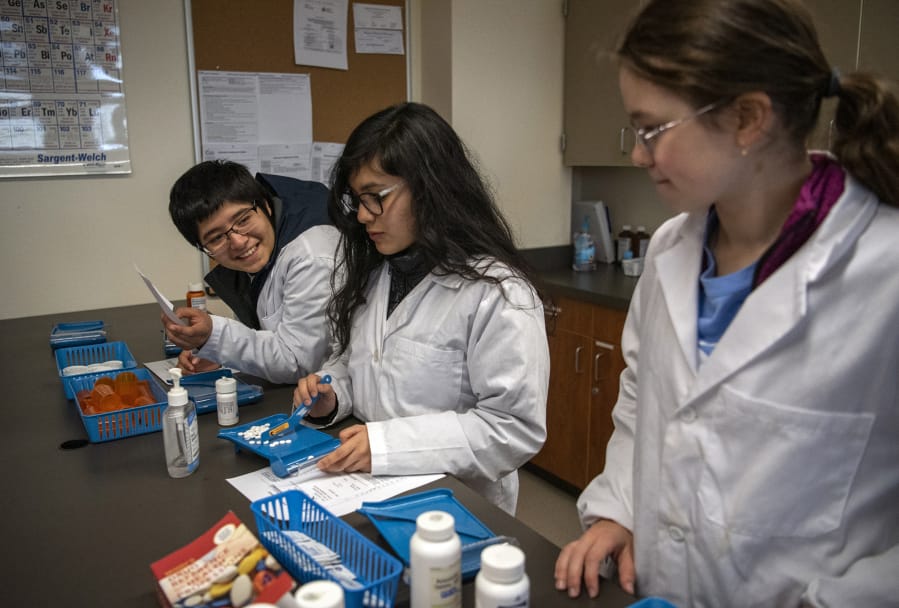At a time when some schools across the U.S. are rethinking their names or mascots, one high school in Vancouver is driven by its name.
You can read the headlines about schools ditching Confederate-inspired names from the Civil War. Or swapping out names of presidents who favored prejudiced policies. But Henrietta Lacks Health and Bioscience High School, isn’t only comfortable with its name, it’s proud of it, said Julie Tumelty, the school’s principal since it opened in 2013.
The high school is the first public building in the country named after Lacks, a black cancer patient who had cells taken from her body without consent in 1951. She died at age 31 that same year. Her cells ended up as the most widely used human cells in scientific research. The high school chose her name instead of Mother Joseph.
“We’re a school who wants to honor the legacy of this woman, who never had a chance to be honored when she was alive,” Tumelty said.
Tumelty called Lacks’ story “fascinating,” since it carries the complexity of unethical medical research that helped lead to medical advancements.
Lacks visited Johns Hopkins Hospital in 1951 in Maryland, complaining of vaginal bleeding. She had a large, malignant tumor on her cervix. That’s when her cells were harvested without her consent. Dr. George Gey, a cancer researcher, collected cells from patients at Johns Hopkins, but each time, the cells died quickly. Lacks’ cells were different. They doubled every 20 to 24 hours.
The cells taken from Lacks’ cancerous cervical tumor became the first naturally “immortal” cell line from a human, which means the cells don’t die after a set number of cell divisions and can reproduce indefinitely under the right conditions.
They were the first cells to live outside the body in a glass tube, according the Washington Post. The cells are named HeLa, and were crucial to the development of the polio vaccine and “are used to study the effects of toxins, drugs, hormones and viruses on the growth of cancer cells without experimenting on humans,” according to Johns Hopkins University.
Lacks’ family wasn’t made aware of HeLa’s existence until 1975, and they haven’t received any compensation. Johns Hopkins has said there was no precedent for consent of taking cells at the time. Lacks story fits into the history of African Americans being experimented on without consent.
Awareness about Henrietta Lacks has risen since Oprah Winfrey produced and starred in a movie about Lacks in 2017 that was based off “The Immortal Life of Henrietta Lacks,” a 2010 book written by Rebecca Skloot, who graduated high school from Metropolitan Learning Center in Portland.
Tumelty is trying to raise awareness about the school, and Lacks. There’s still some confusion in Clark County about Henrietta Lacks Health and Bioscience High School, or HeLa High School, which Tumelty said can also be used, given how much of a mouthful the formal name is.
“What’s this school?” Tumelty said people ask her. “There’s still a lot of misinformation about our school, or people who don’t even know our school is here.”
In some ways, that’s because HeLa High is not your average high school. It’s a speciality school with fewer than 600 students that offers programs in biotechnology, biomedical engineering, public health, nursing and patient services, and pharmacy. Students start their program of study in the junior and senior years. It has a 24-to-1 teacher to student ratio.
Students take math, English, science and social studies classes at the school, but they get the opportunity of exploring health sciences more thoroughly than other schools. The school was built to help the Evergreen School District address overflow problems, while also focusing on a growing professional field in the area.
“Kids have a shared focus. They want to do school a little different,” Tumelty said. “They have some ideas of what they want to pursue in the future, but it doesn’t mean they are locked in.”
The school has a graduation rate of 97 percent the past four years, Tumelty said. She credited part of that rate to the idea that kids choose to attend HeLa High. The school has an application process, but isn’t exclusive, Tumelty explained.
Tumelty said every ninth-grader is required to read Skloot’s book and do research on Lacks.
“It’s important our students know the story. We have all that consent now and she didn’t have that,” Tumelty said. “While so many good things came from it, there’s a lot of heartache through her family.”




